Wow, this is so much better.
I was not kind to Iron Fist season one when it aired, nor did it deserve it. Show-runner Scott Buck evinced no understanding of kung fu or martial arts in general, nor of the character that Marvel has been producing comics with since 1973, and then he doubled down by casting an actor with no martial arts experience whatsoever to play one of the greatest martial artists in the Marvel canon.
After that, the character appeared in The Defenders—where they leaned into his being a twerp—and an episode of Luke Cage season two—in which Finn Jones acted and sounded more like the Danny Rand I’ve been reading since I was a kid than he had anywhere else.
M. Raven Metzner took over the show-running duties with IF season two, and while I was a bit nervous that they were giving the show to the person who co-wrote the script for the Jennifer Garner Elektra movie, based on the first three episodes, things are looking considerably up.
SPOILERS FOR THE FIRST THREE EPISODES OF IRON FIST SEASON TWO, AS WELL AS THE OTHER MCU NETFLIX SHOWS.
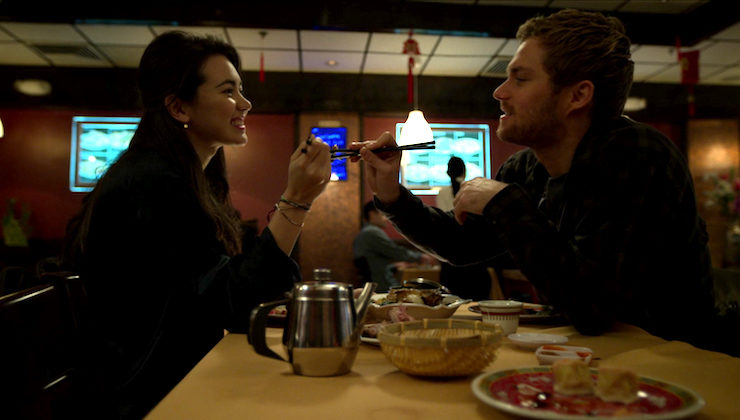
Like the second season of Luke Cage, the sophomore season of IF not only picks up from its first season, but also The Defenders, particularly Rand’s promise to Matt Murdock to keep protecting the city, not to mention that series’ destruction of the Hand and not only Rand’s role in it, but also Colleen Wing’s.
Indeed, one of the main reasons why these first three episodes work so much better than, well, the entirety of season one is that they’re limiting Finn Jones’s exposure. He’s still the central character, but he’s part of an ensemble, and the rest of the ensemble is showcasing their strengths.
Metzner sensibly isn’t pretending the first season didn’t happen—that’s hard to do in as continuity-heavy a setting as the Netflix series, though not impossible, as Jessica Jones season two and The Punisher season one proved—but rather taking it and figuring out what the best next step is.
Wing is obviously traumatized by her experiences with the Hand. After going through the cathartic trauma of beheading her mentor in The Defenders, she has given up the Chikara dojo (which was a Hand front), having converted it to a very nice apartment for her and Rand. She’s volunteering at a Chinatown charity center, helping people with immigration paperwork and generally supporting the poorer members of the community.
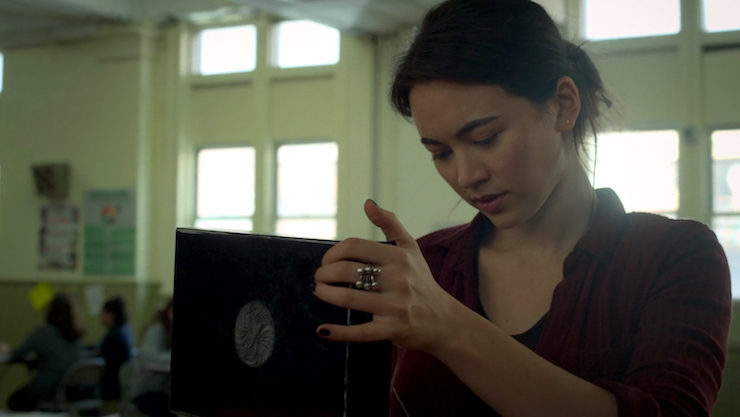
Both Ward and Joy Meachum are recovering from the trauma of what their father Harold did to them. In Ward’s case, he’s in Narcotics Anonymous and trying to run Rand Enterprises by himself, since Joy disappeared after season one and Rand himself isn’t interested in being an active CEO. Ward’s not doing very well at it, because he’s still a self-centered asshole who was psychologically abused by his father, but he’s trying at least.
Joy wishes to divest herself of Rand Enterprises, as she’s livid at Rand and Ward for not telling her that Harold was alive. Her anger, while completely understandable, is misplaced, as Harold didn’t give either of them a choice; Ward had been his whipping boy for years, and Harold expertly manipulated Rand. Nonetheless, one cannot blame her for not wanting to be involved with either of the two men who kept the fact that her father was alive from her, never mind that the father—who’s now dead—forced them to.
And as we saw at the end of last season, Joy has teamed up with Davos, Rand’s former best friend, and the only other K’un L’un native still walking around, as the city has disappeared. Davos wants the iron fist for himself, and he’s working with Joy to accomplish that. For Joy’s part, her interest is in seeing Rand go through what she did. Her life was simple and orderly and understandable until Rand walked back into her life with his bare feet and twerpy attitude, and she lost everything.
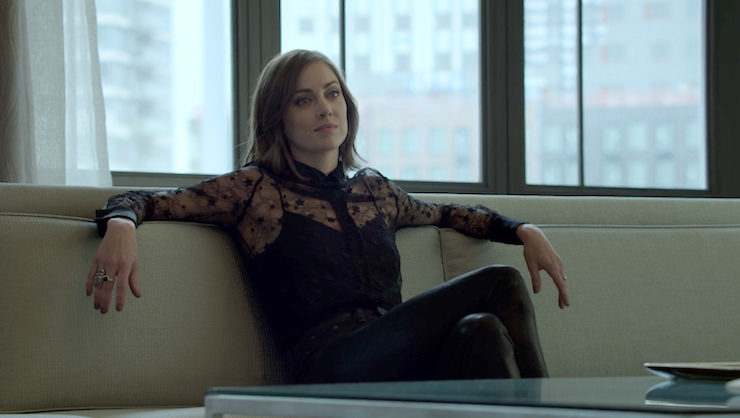
Rand himself is finally acting the way he should’ve been acting all along: trying to assimilate into life in New York and trying to figure out who he is and what he is now. The purpose of the Immortal Iron Fist is to protect K’un L’un from the Hand, but now K’un L’un and the Hand are both gone. So he’s trying to protect the city, as Murdock charged him.
He’s also trying to find himself. Throughout all of his prior appearances, he’s been accused of not understanding things because he’s rich and never had to work for his money. To that end, he takes a job with a moving company (working for Albert, played by James Hiroyuki Liao, whom I am disappointed to see is only in the first episode, grumble, as he’s one of my favorite Noo Yawk actors) so he can appreciate the value of working for a living.
The biggest improvement from season one so far is that the plotting is intricate and all coming together nicely, at least so far. There are seven more episodes for it to go to hell, of course, but for the moment the different threads are weaving together nicely. (And yes, only seven more episodes. This season is only ten episodes, which can only be a good thing, as too many of the MCU Netflix shows have been painfully padded.)
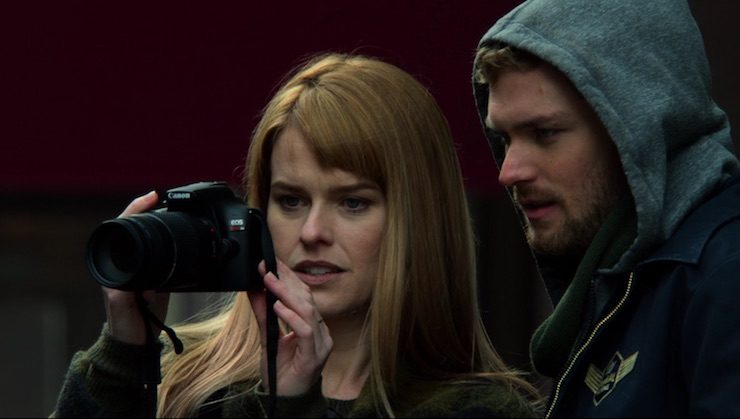
There’s the unintended consequences of the Hand’s destruction, which is that the gangs of Chinatown are starting to go to war again, without the Hand keeping them in check. Rand is trying to get the two sides to talk to each other, but he’s stymied by a number of outside factors, including Davos, who is doing a deal with the head of one side, a deal that is scotched by the attempt at a truce.
And then there’s Wing’s discovery of a box left at the community center that has the same family crest as her sword. She’s only just started her family quest as of the third episode, but it’ll be interesting to see where it leads.
We also finally get something we should have seen in season one, which is flashbacks to K’un L’un. In particular, we get a magnificently choreographed display as Rand and Davos fight for the right to confront Shao Lao the Undying to claim the power of the iron fist.
That sequence is one of the best, partly because they went and hired a better fight choreographer for season two (Clayton Barber, who also did the fight choreography for Black Panther), but mainly because it reveals Davos’s tragic flaw. The battle is observed by Yu-Ti, the August Personage in Jade, and Lei Kung the Thunderer. Established back in Iron Fist’s debut in Marvel Premiere 45 years ago as, respectively, the head of K’un L’un and the person who trained Rand, they are joined by a character I’m fairly certain we never saw in the comics, Lei Kung’s wife Priya, who is also Davos’s mother.
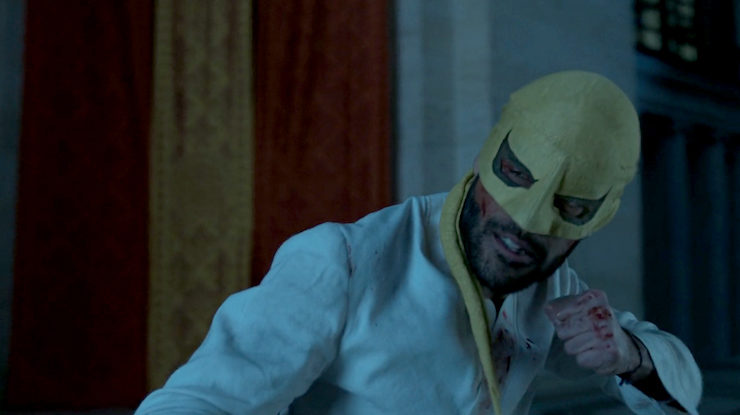
When Davos almost kills Rand, and begs him to yield, Lei Kung says nothing. But when Rand recovers and almost kills Davos, who also refuses to yield, Lei Kung calls off the fight and declares Rand the victor preemptively. It is obvious from the expressions on the faces of Hoon Lee and Gita Reddy that Lei Kung does not wish to see his son die in front of his mother, so he calls it. But Davos very obviously doesn’t see that. He feels that Rand stole the iron fist from him, that Lei Kung gave it to him because he favored Rand over his own son, and it’s in fact the opposite.
There are also some new characters, most notably Alice Eve as Mary Walker, the MCU version of Typhoid Mary, a character with dissociative identity disorder. We first meet her as a recent arrival to New York City who meets Rand and Albert on the job, asking for directions, and who is eventually revealed to be someone hired by Joy and Davos to surveil Rand. Walker is a wild card in this season, and I’m tentatively curious as to what they do with her. (Metzner was partly responsible for the last live-action attempt to do Typhoid in Elektra, and it could charitably be called a disaster.) And then we have Chinese gangster BB, who had better become interesting soon, because right now, he’s a walking talking cliché who gives Wing someone to talk to, but isn’t worth it for that.
This is still the least of Marvel’s Netflix offerings. Jones doesn’t have anywhere near the chops or charisma of Charlie Cox, Krysten Ritter, Mike Colter, or Jon Bernthal, and this season seems to have the too-many-villains problem of the first, as we’ve got Davos and Joy and Walker and the Chinatown gangs. It’s a bit too much, and none of them are as compelling as the Kingpin, Kilgrave, Elektra, Cottonmouth, Bushmaster, Mariah Dillard, Alexandra, or Madame Gao.
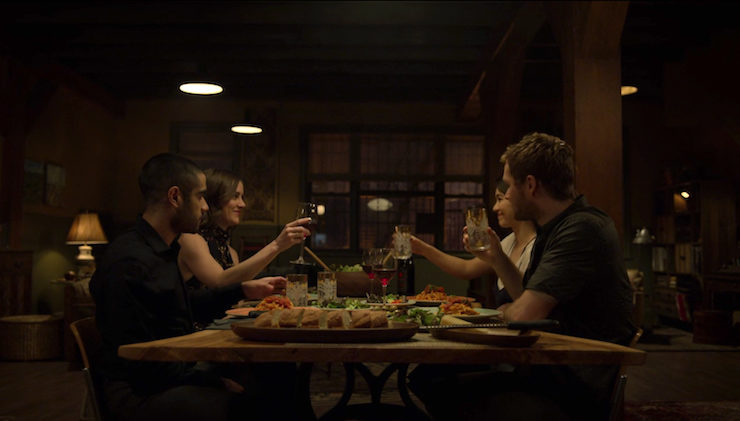
But so far at least, it feels like Iron Fist for the first time. In addition, the rest of the cast makes up for Jones’s slack. Jessica Henwick remains superb as Wing—her calling everyone on their bullshit during the awkward dinner party in episode three is magnificent. Sacha Dhawan still feels like he should’ve been cast in the title role, and generally does excellent with Davos’s reserved intensity. Jessica Stroup, freed from the inconsistent characterization of season one, is far more compelling as the much more focused and angry version of Joy. Tom Pelphrey remains excellent as a Ward who really is trying to get better, but has to get through an entire lifetime of being a schmuck in order to manage that. And while I’m iffy about the character, Alice Eve is doing a fine job portraying Mary Walker thus far.
Later this week, I’ll have a more detailed review of the entire season—which will include, among other things, the arrival of Simone Missick as Misty Knight, which means more Daughters of the Dragon-y goodness!
Keith R.A. DeCandido has previously reviewed Iron Fist season one, The Defenders season one, The Punisher season one, and Luke Cage season two for this site. His regular feature, “4-Color to 35-Millimeter: The Great Superhero Movie Rewatch” appears on this site every Friday at noon, and he’s also written about Star Trek, Doctor Who, Wonder Woman, Batman, Stargate, and more. When he’s not dropping pixels here on Tor.com, he’s the author of novels, short fiction, and comics, both in a variety of licensed universes from Alien to Zorro and in worlds of his own creation. His full bibliography can be found here.










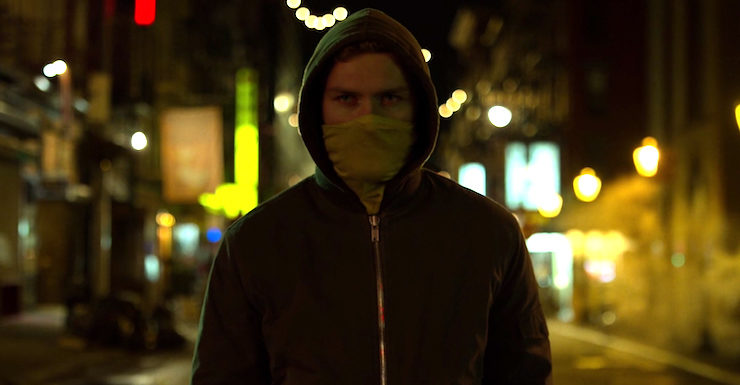
It’s Raven Metzner, not Mentzer.
“And then we have Chinese gangster BB”
Hardly a gangster, just a street kid squatting in territory controlled by gangsters and trying to avoid their notice. And he’s only part-Chinese.
If you don’t find Walker compelling yet, just keep watching. I’ve only seen Alice Eve in two things before (Men in Black 3 and Star Trek Into Darkness), so she was a revelation here. I also thought Sacha Dhawan was pretty compelling as Davos.
And speaking of actors you wish were in more than one episode — Hoon Lee has an amazing voice, doesn’t he?
@1 – Name fixed, thanks!
If anyone is skeptical of S2 after the disaster of S1, trust me — S2 is WAY better. I binge watched the whole season this weekend, so I won’t spoil. But yeah, much better.
I’ll be interested to see how everyone reacts to the ending. I liked it, though it leaves some questions very open indeed.
One thing I did notice (and it’s NOT a spoiler): something about the way Patricia Stroup plays Joy — maybe it’s the hair or the looks on her face or whatever — reminds me of Faith. Is this my imagination?
Just curious: in a close-up Mary Walker turns out to have one blue eye and one green. Is this consistent with the comics?
jefffrane: Yes.
—Keith R.A. DeCandido
Mary becomes much more interesting. Right now you’ve really only seen her Mary personality, which is pretty lukewarm on purpose.
I enjoyed S2 much more than S1. And trimming it down to 10 episodes was a smart move for Iron Fist. I agree with you Krad on pretty much all of your review. Especially the fact that they use much more of the supporting cast (especially Colleen Wing).
One thing you didn’t mention (maybe because you are only covering the first 3 episodes) but S2 has NONE of the Boardroom BS that S1 got so mired in.
I feel like someone at Marvel/Netflix actually did read all of the reviews of S1 and addressed the major issues.
@4/jeffrane: I don’t know about the comics character, but Alice Eve actually does have heterochromia (differently colored eyes) in real life.
@6/Kalvin: I noticed the complete lack of any scenes set at Rand Industries. Maybe that has something to do with how fakey the office sets looked in season 1, with visibly flat cityscape translights through the windows.
I expect we’ll see a lot more 10-episode seasons, or maybe 8 like The Defenders, in the future. Apparently the Marvel shows were previously operating under a contract that obligated them to do 13-episode seasons, but that contract has since expired and been redone, or something, so that requirement is no longer in place. And the industry trend in cable and streaming shows seems to be toward seasons of 10 episodes or less.
I liked the new season enough that I reinstalled my old copy of Jade Empire.
Hopefully there isn’t a new hard limit on episodes. I’d much prefer if each season had the flexibility to add or subtract a few episodes depending on the needs of the story. It might be easier to fill 10 than 13, but given the platform I’d think it should be easy enough to do variable season runs according to the dictates of plot and pacing.
@9/Porphyrogenitus: That’s basically what I meant to convey — that before they were stuck with a strict 13-episode mandate, but now there’s no mandated length, so they’re free to make the seasons whatever length is deemed appropriate. It’s just that shorter seasons, say 7-10 episodes, seem to be a “sweet spot” for season-arc storytelling and streaming TV.
Anyway, one advantage of shorter seasons is that you have more money to spend on each individual episode. I noticed something about this season of Iron Fist that’s pretty much unique for Marvel Netflix. Usually with these shows, you have only 2-3 leads who are in every episode of the season (or nearly so) and the rest of the main cast drops in and out, missing at least one or two episodes per season. It ranges from 4 actors in every episode of Luke Cage season 2 (Mike Colter, Simone Missick, Alfre Woodard, and Theo Rossi) to just Krysten Ritter in every episode of Jessica Jones season 1. I figure that’s probably a money-saving move, reducing the number of episodes they have to pay the actors for. But here, aside from Missick being in only 6 episodes, the other 6 main cast members were consistent for all 10. Maybe that was doable because of the shorter season. Conversely, though, maybe the tighter storyline meant there were fewer openings for letting a character skip an episode or two.
I may have nitpicks later, but for now, my short review is that I would’ve liked the Davos story shrunk down to half the episodes, 5 or less, and skipped to what is set up in episodes 9 and 10. Gimme season 3 already.
Agreed with most points in your review krad. I don’t find Davos that compelling and not even all that threatening, even though he’s a killer. Is it fair to blame the actor’s short stature? He has intensity to spare, but it’s of the chihuahua variety, overcompensating for insecurity. Ward even makes a joke about it at one point, making that hand gesture down low, like “The little guy? That’s who we’re afraid of?”
We also once again have the dragon represented by two red lights and K’un L’un only as a giant domed room interior. Even The Magicians, which does a lot with a very limited budget, showed us a convincing dragon. I suspect that IF is very low budget and perhaps it’s woes stem from that. Many of the scenes could be from a stage play. Many are set in abandoned buildings with no set dressing. This show is often bare looking.
So, yes, an improvement overall, if we’re grading on a curve, and certainly worth sticking around till the end.
The fight scenes may have improved. But i think we’ve seen better. A lot better (Into The Badlands for example).
It’s obvious that stunt doubles were used in many of Finn’s scenes. Notice the hood he’s wearing during the fights?
@@@@@ 12
No, I don’t think it’s fair to blame his short stature. See Yayan Ruhian who plays Mad Dog in the Raid: Redemption. Dude is 5′ 2″ and terrifying. Also if you haven’t seen it, it’s easily one of the best action films ever made. The Raid 2 is overrated but good.
I’m afraid Davos isn’t that compelling because his character is flat.
The most unforgivable part of S1 was that Danny’s martial arts “skills” (I use the term loosely) were laughable when compared to what we had just watched in DD S2. Much of the rest of the character issues could be ascribed to PTSD just now coming to the surface as he returned to New York to face his past for the first time since the plane crash. But they didn’t really lean in to that part of the narrative, and it was completely undercut by Finn’s lack of skill. Losing control of the Iron Fist shouldn’t make him so incompetent when facing normal everyday thugs and cut-rate ninjas.
While I agree with many points in this review, overall I find it far too benevolent. Indeed, S2 comes ahead of S1, but that doesn´t mean it doesn´t suck. I wonder if your perception will change once you go over the entire season. Some random thoughts:
-As already presented in Luke Cage S02, Danny is less of a douche, and that is certainly an improvement. His character is far less unlikeable now. Unfortunately, his fight scenes remain consistently embarrassing. It’s not only the doubling, it’s the choreography, the cinematography… the issue is even more severe whenever Colleen fights at the same time Danny does, as the action shifts between her spectacular pieces and Danny’s clumsy strikes and shaky close-ups, highlighting how much the latter stink. This is simply an unbelievable mistake in terms of casting and coaching. I can only assume Finn not only does not know martial arts, but has zero potential to learn them: I heard season 1 was rushed and he had very little time to prepare his fight scenes. But this is s02, and other fight scenes feel perfectly choreographed: we can only assume Finn Jones cannot be taught martial arts and cannot be bothered to learn a fight choreography.
-Use of the Iron Fist has improved in terms of creativity, and we get to see a bit more besides “punchy explodey stuff”. Sometimes the fist related FX were a bit wonky (particularly a couple of moments where the fist seemed to turn on and off like a damn lightbulb -cheif among them, the time when Davos punches a brick to use it as a projectile…I loved that particular use of the fist, but the way he turned it on was really disconcerting). Also… can someone explain to me the final scene, with Ward, Danny and the damn glowy iron fisty pistols??
-Misty is a charismatic character, played by a charismatic actress, and she makes every scene she is in 200% better. Considering how this season has gone out of its way to incorporate her into the story and highlight and develop her relationship with Colleen, I hope this means we will see more of the Daughters of the Dragon in the future. Frankly, I would be OK if they made Danny a secondary character and allowed these two to take the spotlight.
-Story-wise, while the smaller number of episodes reduces a bit the Netflix bloating of earlier entries, the story still feels too padded.. too many villains, too many side arcs. There were points where I liked where it was going, and points where I almost rage-quitted watching it. Almost like with Fear the Walking Dead.
-Speaking of rage-quitting, there are a number of cheap, lazy storytelling choices that really drive me nuts: from Joy’s turn to the dark side (They lied to you, OK. Do you really need to destroy them for that?) to certain surreal moments (Danny’s first injury has him on the brink of death… until the doctor bloody puts three staples on his wound… “wow, he is stable”. Really? This is no Grey’s Anatomy, we don´t need to know the details, but at the very least they should try and make the stakes feel high and the resolution touch and go without asking us to crank the suspension of disbelief up to “toddler” level. Ditto to Danny’s second injury, and how they fix it: WayneTech gadget + training montage = win!)
Bottom line: far less stinky than IF S02, but still right at the bottom of the Marvel Netflix entries.
@17/Manuel Aguirre: “Also… can someone explain to me the final scene…”
Maybe that question should be saved for the full-season spoiler thread to come later. But it’s a reference to Orson Randall, the character they were searching for in the tag scene, and Danny’s predecessor as Iron Fist in the comics.